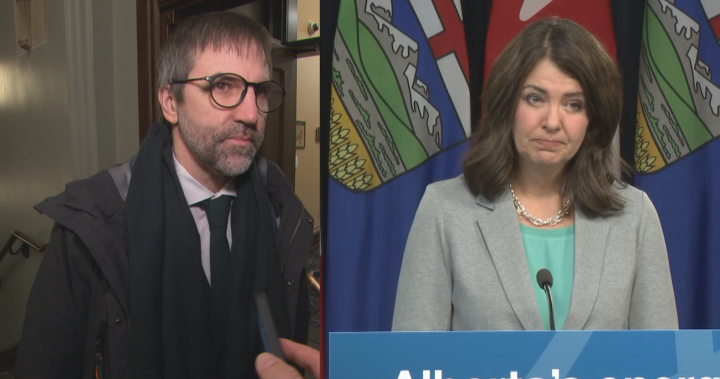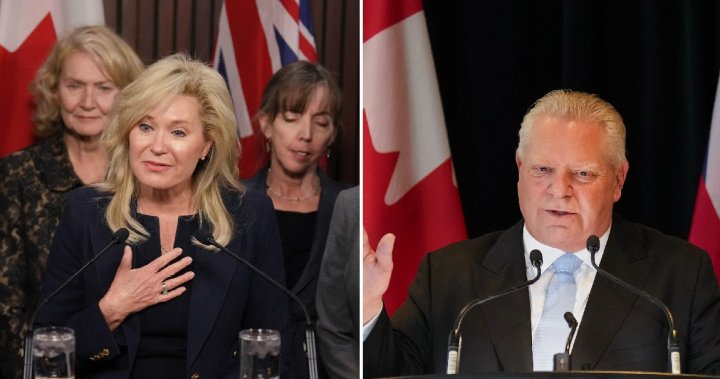Environment Minister Steven Guilbeault said the federal government won’t take Alberta to court over its use of the Sovereignty Act.
Alberta Premier Danielle Smith invoked the Alberta Sovereignty Within a United Canada Act on Monday, legislation the province has threatened to use to push back on Ottawa’s proposed clean energy regulations (CER).
Speaking to reporters in the hallways of the House of Commons Tuesday, Guilbeault said the legislation won’t impact the federal government’s plan to green Canada’s electricity grid by 2035.
“Premier Smith said herself (Monday) that the sovereignty act is a largely symbolic gesture,” he told reporters. “You don’t take someone to court for something that’s symbolic.”
Alberta has been in negotiations with the federal government over the draft clean energy regulations, which Alberta maintains would require a significant shift for the province’s natural-gas reliant electricity grid.
Smith has argued that a carbon-neutral electricity grid by 2050 is a more feasible target for Alberta, with concerns the feds’ 2035 goal would result in higher electricity prices or unreliable power generation.
Smith told reporters that Alberta will not “sit and wait,” in response to Guilbeault’s comments.
“He will learn that if he does not back down from his outrageous and unconstitutional targets of 2035, it will be more than symbolic,” Smith said. “We will proceed with developing our base-load power on natural gas with the best available technology.”
The sovereignty act motion calls on cabinet to order all provincial entities to ignore the federal regulations, which haven’t yet been enacted.
The legislation wouldn’t apply to private companies, which make up nearly the entirety of Alberta’s electricity grid.
Alberta is also looking to launch a court challenge against the federal clean electricity regulations.
“This is just the indication that we’re moving on this,” Smith said. “We’re not going to sit and wait while they break the law, drag their feet make us take them to court and spend years creating economic uncertainty for our investors.”
Uncertainty is something the Calgary Chamber of Commerce said it hopes to avoid, as it also advocates for a revision of the clean energy regulations.
The chamber’s president, Deborah Yedlin, said the regulations as proposed would result in “economic and social consequences” around grid reliability, stability, and affordability.
“Our gift is natural gas, it is not hydro, and so we need to make sure that is still part of our electricity generation,” she said. “We’ve got the renewables piece, we know that and that’s a part of where we’re going, but it’s just not realistic to think that you can do it all with renewables.”
However, Yedlin questions whether the sovereignty act is the right tool to accomplish any revisions to the federal regulations.
“The worry is that now that this piece of legislation has been introduced. What’s the incentive to continue to negotiate in good faith on the part of Ottawa?” Yedlin said. “That introduces another element of uncertainty in terms of the direction of the conversations and the revisions that have been asked for.”
Another motion in the act calls on Alberta to consider the creation of a Crown electricity corporation.
Smith said the move would be a last resort and not to compete with the province’s privately run electrical grid.
That motion has several electricity generation companies looking into potential implications for their customers and the local power market.
The Independent Power Producers Society of Alberta (IPPSA), which is made up of several privately run power generation companies, said it acknowledges the province’s intention to build “contingency plans” related to the federal government’s 2035 net-zero target.
“We recognize this as a precautionary measure to be contemplated in the mid-2030s only if mutually agreeable terms of the CER design and implementation plan cannot be reached between the two governments, thereby ensuring the reliability and affordability of the provincial grid during the net-zero transition,” the group said in a statement. “IPPSA remains confident that a fair and competitive environment for electricity generation in Alberta continues to be the best outcome for Albertans.”
BluEarth, a renewable electricity generator in Alberta, also said it is working to determine what impacts may arise from the clean energy regulation debate.
“BluEarth is currently in the process of understanding the implications of the Government of Alberta’s directive, and the impacts that this may have on Alberta’s open and competitive market which has previously attracted considerable private investment,” BluEarth CEO Grant Arnold said in a statement.
Enmax, a wholly-owned subsidiary of the City of Calgary, said it will be taking the coming days to understand what the use of the Sovereignty Act means for its customers, business and industry as a whole.
Calgary’s mayor said it is still too soon to tell what those implications may be.
“I know that administration, especially intergovernmental affairs, is keeping a close eye on this,” Jyoti Gondek told reporters. “We remain engaged to see what the implications are, right now we don’t know what that looks like.”
© 2023 Global News, a division of Corus Entertainment Inc.




